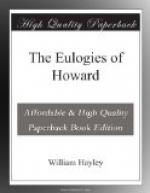ages upon the Earth, certain elevated spirits, who,
by the sublimity of their conceptions, and the magnanimity
of their conduct, attain a degree of glory which can
never be reached by the keenest followers of Fame—They
seek not panegyricks; and panegyricks can add nothing
to their honour. The Eulogies have perished which
were devoted by the luxuriant genius of Tully, and
by the laconic spirit of Brutus, to the public virtue
of Cato; yet the name of that illustrious Roman is
still powerful in the world, and excites in every cultivated
mind, an animating idea of independent integrity.
The name of Howard has superior force, and a happier
effect. It is a sound, at which the strings of
humanity will vibrate with exultation in many millions
of hearts. Through the various nations that he
visited, the mere echo of his name will be sufficient
to awaken that noblest sensibility, which at once
softens and elevates the soul. Every warm hearted
and worthy individual who mentions Howard will glow
with an honest, a generous satisfaction, in feeling
himself the fellow-creature of such a man. Wherever
the elegant arts are established, they will contend
in raising memorials to his honour. Indeed, the
globe itself may be considered as his Mausoleum; and
the inhabitants of every prison it contains, as groups
of living statues that commemorate his virtue.
There is no class of mankind by whom his memory ought
not to be cherished, because all are interested in
those evils (so pernicious to society! so dangerous
to life!) which he was ever labouring to lessen or
exterminate. It might be wished, that different
communities should separately devise some different
tribute of respect to him whose character and conduct
is so interesting to all: not for the sake of
multiplying vain and useless offerings to the dead,
but to impress with more energy and extent his ennobling
remembrance on the heart and soul of the living.
It is hardly possible to present too frequently to
the human mind the image of a man who lived only to
do good. I mean not merely such a resemblance
of his form as Art may execute with materials almost
as perishable as the image of human clay, but such
an impression of his soul as may have a more lasting
influence on the life and conduct of his admirers,
such as, diffusing among them a portion of his spirit,
may in some measure perpetuate his existence.
“By this community, I am confident, such public honours will be paid to Howard, as may be most suitable to the peculiar interest which it becomes us to take in his glory. What these honours shall be is a point to be settled by this liberal and enlightened Assembly, which assuredly will not fail to remember that he suggested to Legal Authority her omissions and defects with the modest and endearing tenderness of a Friend; that he laboured in the service of Justice with that intelligence, fortitude, and zeal, which her votaries cannot too warmly admire, or too gratefully acknowledge.”




